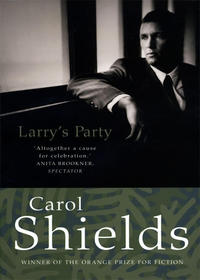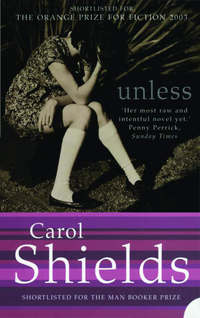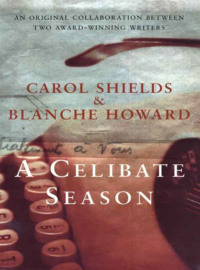
Полная версия
Collected Stories
One of the sisters, a little pug of a woman, particularly stirred his contempt, she of the pink pantsuit, the red toenails, the grapefruity buttocks, the overly bright souvenirs, the garish Mexican straw bag containing Dentyne chewing gum, aspirin, breath mints, sun goggles, envelopes of saccharine, and photos of her dead husband standing in front of a squat, ugly house in Winnipeg. This defilement she had spread before the ancient and exquisitely proportioned Golden Pavilion of Kyoto, proving—and here the Professor’s tone became grave—proving that sublime beauty can be brought to the very doorway of human eyes, ears and lips and remain unperceived.
When he comes to the end of “A Day at the Golden Pavilion” there is generally a thoughtful half second of silence, then laughter and applause. Students turn in their seats and exchange looks with their fellows. They have seen such unspeakable tourists themselves. There was old Auntie Marigold or Auntie Flossie. There was that tacky Mrs. Shannon with her rouge and her jewelry. They know—despite their youth they know—the irreconcilable distance between taste and banality. Or perhaps that’s too harsh; perhaps it’s only the difference between those who know about the world and those who don’t.
It’s true that Mrs. Turner remembers little about her travels. She’s never had much of a head for history or dates; she never did learn, for instance, the difference between a Buddhist temple and a Shinto shrine. She gets on a tour bus and goes and goes, and that’s all there is to it. She doesn’t know if she’s going north or south or east or west. What does it matter? She’s having a grand time. And she’s reassured, always, by the sameness of the world. She’s never heard the word commonality, but is nevertheless fused with its sense. In Japan she was made as happy to see carrots and lettuce growing in the fields as she was to see sunlight, years earlier, pouring into the streets of New York City. Everywhere she’s been she’s seen people eating and sleeping and working and making things with their hands and urging things to grow. There have been cats and dogs, fences and bicycles and telephone poles, and objects to buy and take care of; it is amazing, she thinks, that she can understand so much of the world and that it comes to her as easily as bars of music floating out of a radio.
Her sisters have long forgotten about her wild days. Now the three of them love to sit on tour buses and chatter away about old friends and family members, their stern father and their mother who never once took their part against him. Muriel carries on about her children (a son in California and a daughter in Toronto), and she brings along snaps of her grandchildren to pass round. Em has retired from school teaching and is a volunteer in the Boissevain Local History Museum, to which she has donated several family mementos: her father’s old carved pipe and her mother’s wedding veil and, in a separate case, for all the world to see, a white cotton garment labeled “Girlie Fergus’s Underdrawers, handmade, trimmed with lace, circa 1918.” If Mrs. Turner knew the word irony she would relish this. Even without knowing the word irony, she relishes it.
The professor from Massachusetts has won an important international award for his book of poems; translation rights have been sold to a number of foreign publishers; and recently his picture appeared in the New York Times, along with a lengthy quotation from “A Day at the Golden Pavilion.” How providential, some will think, that Mrs. Turner doesn’t read the New York Times or attend poetry readings, for it might injure her deeply to know how she appears in certain people’s eyes, but then there are so many things she doesn’t know.
In the summer, as she cuts the grass, to and fro, to and fro, she waves to everyone she sees. She waves to the high school girls, who timidly wave back. She hollers hello to Sally and Roy Sascher and asks them how their garden is coming on. She cannot imagine that anyone would wish her harm. All she’s done is live her life. The green grass flies up in the air, a buoyant cloud swirling about her head. Oh, what a sight is Mrs. Turner cutting her grass, and how, like an ornament, she shines.
Accidents
AT HOME MY WIFE IS MODEST. She dresses herself in the morning with amazing speed. There is a flashing of bath towel across the fast frame of her flesh, and then, voilà, she is standing there in her pressed suit, muttering to herself and rummaging in her bag for subway tokens. She never eats breakfast at home.
But the minute we hit the French coast—we stay in a vacation flat owned by my wife’s brother-in-law—there she is, on the balcony with her bare breasts rising up to the sun. And she has breakfasted, and so have I, on three cups of coffee and a buttered croissant.
Her breasts have remained younger than the rest of her body. When I see her rub them with oil and point them toward the fierce sunlight, I think of the Zubaran painting in the museum at Montpellier which shows a young and rather daft-looking St. Agatha cheerfully holding out a platter on which her two severed breasts are arranged, ordinary and bloodless as jam pastries.
One morning something odd happened to my wife. She was sitting on the balcony working on her new translation of Valéry’s early poems and she had a cup of coffee before her. I should explain that the dishes and cutlery and cooking things in the flat are supplied, and that this particular coffee cup was made of a sort of tinted glass in a pattern that can be found in any cheap chain store in France. Suddenly, or so she told me later, there was a cracking sound, and her cup lay in a thousand pieces in the saucer.
It had simply exploded. She wondered at first if she had been shot at with an air rifle. There was another apartment building opposite under construction, and at any time of the day workmen could be seen standing on the roof. But clearly it would have required an extraordinary marksman to pick off a cup of coffee like that from such a distance. And when she sifted through the slivers of glass, which she did with extreme care, she found no sign of a pellet.
The incident unnerved her. She put on her blouse when she went out on the balcony later in the day, but I noticed she kept a cup of coffee in the middle of the table as though daring a second explosion to occur.
I knew, though I’m not a scientist, that occasionally tempered glass fractures spontaneously. It’s thought to come about by a combination of heat, light and pressure. It happens sometimes to the windshields of automobiles, though it is extremely rare and not entirely understood.
I told all this to my wife. “I still don’t understand how it could have happened,” she said. I explained again, knowing my explanation was vague and lacking in precision. I was anxious to reassure her. I reached down and put my arms around her, and that was how my accident occurred. She turned to look at me, and as she did so, the back of her earring tore the skin of my face.
It was surprising how long the tear was, about four inches in all, and it was deeper than just a scratch, although the blood oozed out slowly, as though with reluctance. We both realized I would require stitches.
The doctor in the Montpellier clinic spoke almost perfect English, but with a peculiar tonelessness, rather like one of those old-fashioned adding machines clicking away. “You will require a general anesthetic,” he told me. “You will be required to remain in the hospital overnight.”
My wife was weeping. She kept saying, “If only I hadn’t turned my head just at that moment.”
The doctor explained that since the hospital was full, I would have to share a room. Always, he said, gesturing neatly with both hands, always at vacation time there were accidents. A special government committee, in fact, had been established to look into this phenomenon of accidents de la vacances, and someone had suggested that perhaps it might be the simplest solution if vacations were eliminated entirely.
I speak French fluently, having grown up in Montreal, but I have difficulty judging the tone of certain speakers. I don’t know when someone—the doctor, for example—is speaking ironically or sincerely; this has always seemed to me to be a serious handicap.
While still under the anesthetic I was put into a room occupied by a young man who had been in a motorcycle accident. He had two broken legs and a shattered vertebra and was almost completely covered in white plaster. Only his face was uncovered, a young face with closed eyes and smooth skin. I put my hand on my own face, which was numb beneath the dressing, and wondered for the first time if I would be left with a scar.
My wife came to sit by my bed for a while. She was no longer crying. She had, in fact, been shopping and had bought a new pale yellow cardigan with white flowers around the neck, very fresh and springlike. I was touched to see that she had removed her earrings. On her ear lobes there was nothing but a faint dimple, the tiny holes made, she once told me, by her own mother when she was fourteen years old.
There seemed little to talk about, but she had bought a Herald Tribune, something she normally refuses to do. She scorns the Herald Tribune, its thinness and its effete news coverage. And it’s her belief that when you are in another country you should make an attempt to speak and read the language of that country. The last time she allowed herself to buy a Herald Tribune was in 1968, the week of Trudeau’s first election.
The young man with the broken legs was moaning in his sleep. “I hope he doesn’t go on like this all night,” she said. “You won’t get any sleep at this rate.”
“Don’t worry about me,” I said. “I’ll be fine tomorrow.”
“Do you think we should still plan to go over to Aigues Mortes?” she asked, naming the place we try to visit every summer. Aigues Mortes is, as many people have discovered, an extraordinary medieval port with a twelfth-century wall in near-perfect condition. It has become a habit with my wife and me to go there each year and walk around this wall briskly, a distance of a mile. After that we take a tour through the Tower of Constance with an ancient and eccentric guide, and then we finish off the afternoon with a glass of white wine in the town square.
“It wouldn’t feel like a holiday if we didn’t do our usual run to Aigues Mortes,” my wife said in a rather loud cheerful voice, the sort of voice visitors often acquire when they come to cheer the sick.
The man with the broken legs began to moan loudly and, after a minute, to sob. My wife went over to him and asked if she could do anything for him. His eyes were still closed, and she leaned over and spoke into his ear.
“Am I dead?” he asked her in English. “Did you say I was dead?”
“Of course you aren’t dead,” she said, and smiled over her shoulder at me. “You’re just coming out of the anesthetic and you’re not dead at all.”
“You said I was dead,” he said to her in clear carrying British tones. “In French.”
Then she understood. “No, we were talking about Aigues Mortes. It’s the name of a little town near here.”
He seemed to need a moment to think about this.
“It means dead waters,” my wife told him. “Though it’s far from dead.”
This seemed to satisfy him, and he drifted off to sleep again.
“Well,” my wife said, “I’d better be off. You’ll be wanting to get to sleep yourself.”
“Yes,” I said. “That damned anesthetic, it’s really knocked me for a loop.”
“Shall I leave you the Herald Tribune?” she asked. “Or are you too tired to read tonight?”
“You take it,” I told her. “Unless there’s any Canadian news in it.”
That’s another thing we don’t like about the Herald Tribune. There’s hardly ever any news from home, or if there is, it’s condensed and buried on a back page.
She sat down again on the visitor’s chair and drew her cardigan close around her. In the last year she’s aged, and I’m grieved that I’m unable to help her fight against the puckering of her mouth and the withering away of the skin on her upper arms. She went through the paper page by page, scanning the headlines with a brisk professional eye. “Hmmm,” she said to herself in her scornful voice.
“Nothing?” I asked.
“Well, here’s something.” She folded back the page and began to read. “Gilles Villeneuve is dead.”
“Who?”
“Gilles Villeneuve. You know, the racing driver.”
“Oh?”
“Let’s see. It says ‘Canadian racing driver, killed in practice run.’ Et cetera. Always claimed racing was dangerous and so on, said a year ago that he’d die on the track.” She stopped. “Do you want to hear all this?”
“No, that’s enough.” I felt the news about Gilles Villeneuve calmly, but I hope not callously. I’ve never really approved of violent sports, and it seems to me that people foolish enough to enter boxing rings or car races are asking for their own deaths.
“It’s sad to die so young,” my wife said, as if required to fill the silence I’d left.
The young man in the next bed began to sputter and cough, and once again my wife went over to see if she could do anything.
“You mustn’t cry,” she said to him. She reached in her bag for a clean tissue. “Here, let me wipe those tears away.”
“I don’t want to die.” He was blubbering quite noisily, and I think we both felt this might weaken the shell of plaster that enclosed him.
My wife—I forgot to mention that she is still a very beautiful woman—placed her hand on his forehead to comfort him.
“There, there, it’s just your legs. You’ve been sleeping, and you’re only a little bit confused. Where do you come from?”
He murmured something.
“What did you say?”
“Sheffield. In England.”
“Maybe I can telephone someone for you. Has the hospital sent a message to your people?”
It was an odd expression for her to use—your people. I don’t think I’ve ever heard her use that particular phrase before.
“It’s all right,” he said. He had stopped crying, but my wife kept her hand on his forehead for another moment or two until he had dropped off to sleep.
I must have dropped off to sleep as well because when I opened my eyes she had gone. And after that it was morning and a nurse was opening the shutters and twittering something at me in French. The bed next to mine was empty, and she began to strip off the sheets.
“Where is he?” I asked her in my old, formal schoolboy French. “Where’s my comrade with the broken legs?”
“Il est mort,” she said in the same twittering singsong.
“But he can’t be dead. His legs were broken, that’s all.”
“The spinal cord was damaged. And there were other injuries. Inside.”
A minute later the doctor came in and had a look under my dressing. “You perhaps will have a little scar,” he said. “For a woman this is terrible, of course. But for a man …” He smiled and revealed pink gums. “For a man it is not so bad.”
“I understand that he’s died,” I said, nodding at the stripped bed.
“Ah yes. Multiple injuries, there was no hope, from the moment he was brought in here yesterday.”
“Just a young man,” I said.
He was pressing the bandage back into place. “Les accidents de vacances. Every year the same. What can one do? One should stay home, sit in the garden, be tranquil.”
When my wife comes for me in half an hour or so, I will have prepared what I’ll say to her. I know, of course, that the first thing she’ll ask me is: How is the young man from Sheffield? She will ask this before she inquires about whether I’ve had a good night or whether I’m suffering pain. I plan my words with precision.
This, luckily, is my métier, the precise handling of words. Mine is a profession that is close to being unique; at least I know of no one else who does the same sort of work on a full-time basis.
I am an abridger. When I tell people, at a party for instance, that I am an abridger, their faces cloud with confusion and I always have to explain. What I do is take the written work of other people and compress it. For example, I am often hired by book clubs to condense or abridge the books they publish. I also abridge material that is broadcast over the radio.
It’s a peculiar profession, I’m the first to admit, but it’s one I fell into by accident and that I seem suited for. Abridging requires a kind of inverse creativity. One must have a sharp eye for turning points and a seismic sensitivity for the fragile, indeed invisible, tissue that links one event with another. I’m well-paid for my work, but I sometimes think that the degree of delicacy is not appreciated. There are even times when it’s necessary to interfere with the truth of a particular piece and, for the sake of clarity and balance, exercise a small and inconspicuous act of creativity that is entirely my own. I’ve never thought of this as dishonesty and never felt that I had tampered with the integrity of a work.
My wife will be here soon. I’ll watch her approach from the window of my hospital room. She still walks with a kind of boyish clip-clop, as though determined to possess the pavement with each step. This morning she’ll be wearing her navy blazer; it’s chilly, but it will probably warm up later in the day. She’ll probably have her new yellow cardigan on underneath, but I won’t be able to tell from here if she’s wearing earrings. My guess is that she won’t be. In her hand she’ll have a small cloth bag, and I can imagine that this contains the picnic we’ll be taking with us to Aigues Mortes.
“And how is be?” she’s going to ask me in a few minutes from now. “How is our poor young friend with the broken legs?”
“He’s been moved to a different place.” I’ll say this with a small shrug, and then I’ll say, quickly, before she has a chance to respond, “Here, let me carry that bag. That’s too heavy for you.”
Of course, it’s not heavy at all. We both know that. How could a bag containing a little bread and cheese and perhaps two apples be heavy?
It doesn’t matter. She’ll hand me the bag without a word, and off we’ll be.
Sailors Lost at Sea
ONE AFTERNOON, OUT OF CURIOSITY or else boredom, Hélène wandered into an abandoned church. A moment later she found herself locked inside.
This was in France, in Brittany, and Hélène was a girl of fourteen who had been walking home from the village school to the house where she and her mother were temporarily living. Why she had stopped and touched the handle of the church door, she didn’t know. She had been told, several times, that the little church was kept tightly locked, but today the door had opened easily at her touch. This was puzzling, though not daunting, and she had entered bravely, holding her head high. She had recently, since arriving in France, come to understand the profit that could be had from paying attention to good posture, how she could, by a minor adjustment of her shoulders or a lifting of her chin, turn herself into someone who had certain entitlements.
She and her mother were from Canada and, despite her Manitoba accent—which she knew seemed quaint, even comic to French ears, funnier even than Québécois—she was regarded with envy and awe by the girls in the village school in St. Quay. That she was from a place called Winnipeg, the girls found exotic. “Weenie-pegg,” they said, with a giggling way of hanging on to the final g. Her mother said this was because St. Quay was an out-of-the-way sort of place.
This was true. It was a fact that only two girls in her level had ever been to Paris, which was just five hours away by train, and a surprising number of them had never been even as far as Rennes. Also impressive to these girls was the fact that Hélène’s mother was a poet, a real poet, who had published three books. Trois livres? Vraiment? Their eyes had opened wide at this, and they weren’t giggling any longer. (“That’s one thing about the French,” Hélène’s mother told her. “They respect writers.”) The girls at l’école Jeanne d’Arc were forever asking Hélène how her mother was getting on with her poetry. “Ta mère, elle travaille bien?” Their own mothers were the wives of fishermen or shopkeepers. Hélène had been presented to some of these mothers in the village streets: thick-ankled, round-faced women wearing old woolen coats and carrying groceries in bags made of plastic net.
Hélène and her mother had never intended to spend the whole of the year in St. Quay. They had planned to travel, to drift like migrants along the edges of the country. (La France has the shape of a hexagon, Hélène has been taught in the village school; this fact is repeated often, as though it carries mystical significance.) Instead of traveling, they had attached themselves like barnacles—this was how Hélène’s mother put it—to this quiet spot on the channel coast, and Hélène had enrolled in the local school. There was a very good reason for this, her mother surprised her by saying. “The only way to get the feel of the country is to become a part of it.” Of course, as Hélène now knew, and as her mother would soon discover, it was not possible at all for them to become part of the community. Everywhere they went, to the boulangerie, to the post office, everywhere, there was a rustle and a whisper that went before them, announcing, just behind the weak smiles of welcome, “Ah, les Canadiennes!” It made Hélène feel weak; she always was having to compose herself, to imagine how she must look from the outside.
In St. Quay there were a number of old churches, though the largest, a church dating from the thirteenth century, had been torn down ten years earlier. It had been replaced with a brown brick building that was square and ugly like a factory, and distressingly empty, distressing, that is, to the local priest, a Father Dominic. He was an old man with creased yellow skin and a stiff manner, but he was the only friend Hélène’s mother had so far found in St. Quay.
“Alas,” said Father Dominic, rubbing his long chin, “Brittany was once the most religious corner of France, and now it has become, overnight”—he made a zigzag in the air to signify lightning—“secularized.” He said this in his loud, lonely voice, speaking as though there could be no reversal.
“The church,” he said, “has lost out to television and motorbikes and modernism in general, and it has all happened in a flash.”
Well, this was not quite the truth, Hélène’s mother explained later. The truth was that during the French Revolution Brittany had been filled with ranting anticlerical mobs who tore the statues out of church niches and removed stone chunks (heads chiefly or the fingers of upraised hands) from the roadside cavalries that dotted the Côte du Nord. Quel dommage, Hélène’s mother said, in sly imitation of Father Dominic, her only friend.
The particular church where Hélène found herself imprisoned on a Thursday afternoon was one of these small, desecrated churches, statueless and plain, its heavy doors shorn clean of carving and its windows replaced by dull opalescent glass. The church was officially closed. She knew that; it had been closed for many years.
Father Dominic had explained to them that it was no longer served by a priest. Nowadays there was but a single Mass celebrated here each year—it was he who had the privilege of serving—and that was on a certain spring day set aside by tradition to honor sailors who had been lost at sea. On that particular Sunday in early April, the doors would be thrown open and people would enter carrying armloads of spring flowers; after that, a procession would wind over the rocks and down the beach itself.
When Hélène’s mother heard Father Dominic talking about this festival, her eyes had softened with feeling, and she had nodded as though she too had had occasion to pay tribute to lost seamen—which, of course, coming from Winnipeg, she had not.
“That will be something to see,” she said to Hélène, and wrote the name of the festival in her notebook. At that moment, seeing her mother writing down the details of the fete and imagining the blond sunniness of this festive day, Hélène truly understood that they would be staying here the entire year, that their drifting, which she had loved, all ten days of it, was not to be resumed.






